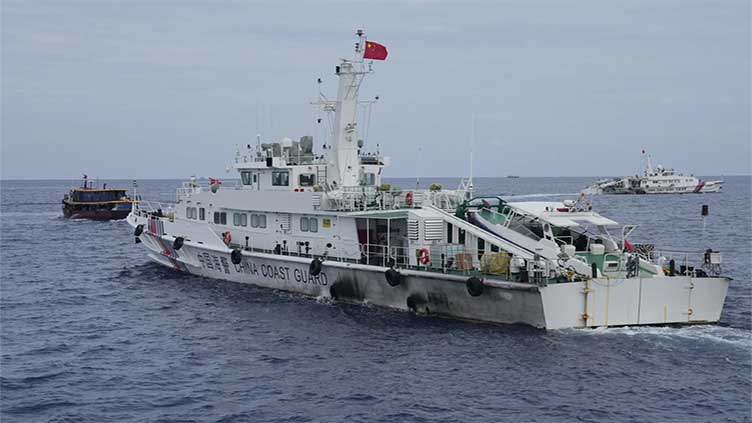Philippine diplomat witnessed Chinese ships' aggressive actions in disputed South China Sea

World
Philippine diplomat witnessed Chinese ships’ aggressive actions in disputed South China Sea
MANILA, Philippines (AP) — A senior Filipino diplomat known for his past expletive-laced tirade against China joined a coast guard trip to the disputed South China Sea last week and saw Beijing’s ships block and nearly collide with Philippine vessels, including one he was on.
Teodoro Locsin Jr. was on one of two Philippine coast guard vessels that escorted two Philippine boats to deliver food and other supplies to a Filipino marine territorial outpost in the Second Thomas Shoal on Oct. 4, the Department of Foreign Affairs said in a statement on Tuesday. It was not immediately clear why the public disclosure of his participation in the trip was delayed.
President Ferdinand Marcos Jr. appointed Locsin, 74, as a special envoy to China in August, in addition to his role as the Philippine ambassador to the United Kingdom based in London.
“We are confident that this firsthand information will allow him to effectively convey our concerns to China,” Daza said.
As the Philippine foreign secretary under Marcos’s predecessor, Rodrigo Duterte, Locsin often lashed out with blunt language on social media at China’s increasingly aggressive actions in the disputed waters.
When a swarm of Chinese boats converged in a Philippines-claimed reef in 2021, the then-foreign secretary demanded in a tweet that the Chinese get out, using an expletive-laced critique.
“What are you doing to our friendship? You. Not us. We’re trying. You. You’re like an ugly oaf forcing your attentions on a handsome guy who wants to be a friend; not to father a Chinese province,” Locsin, a journalist, Harvard-educated lawyer and politician, said in a separate May 2021 tweet.
Locsin has not issued a statement since he witnessed firsthand eight hours of hostilities on Wednesday at the Second Thomas Shoal.
A rich fishing area off the northwestern Philippines, the shoal has been occupied by a small Philippine military contingent but surrounded by China coast guard and militia vessels in a decades-long territorial standoff and has been the scene of recent faceoffs between China and the Philippines.
Two supply boats manned by navy personnel and escorted by two larger Philippine coast guard vessels breached a Chinese coast guard blockade and succeeded in delivering food, water and other supplies to Filipino marines and navy personnel stationed on a long-marooned but still actively commissioned navy ship, the BRP Sierra Madre, at the shallows of the shore.
Chinese coast guard and militia ships, however, blocked and surrounded the two Philippine coast guard escort vessels, including the BRP Cabra, which carried Locsin, from approaching the Second Thomas Shoal.
A Chinese coast guard ship came within a meter (3 feet) of colliding with the other Philippine coast guard vessel, the BRP Sindangan, whose crewmembers averted a collision by abruptly reversing the engine’s thrust and then turning it off, according to Philippine coast guard spokesperson Commodore Jay Tarriela.
“We condemn the behavior of the Chinese coast guard vessel. They have been violating international law, particularly the collision regulations,” Tarriela said at a news briefing Friday.
It’s “the closest dangerous maneuver” by any Chinese coast guard ship against a Philippine patrol ship, he said.
The incident was witnessed by several journalists, including from The Associated Press, who were invited by the Philippine coast guard to join the trip as part of a strategy aimed at exposing aggressive Chinese actions in the South China Sea.
A major clash in the South China Sea, one of the world’s busiest trade routes, could potentially involve the United States, which has vowed to defend the Philippines, its treaty ally, if Filipino forces, ships or aircraft come under armed attack.
China claims virtually the entire waterway on historical ground but this was invalidated by a 2016 arbitration tribunal ruling. China refused to participate in the arbitration sought by the Philippines, rejected the ruling as a sham and continues to defy it.

